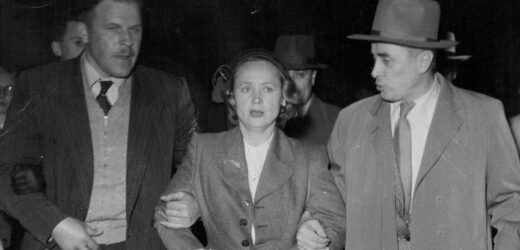HISTORY: Spies and Sparrows: ASIO and the Cold War, Phillip Deery, Melbourne University Press, $34.99
Tony Abbott complained “I never thought dobbing and snitching was part of the Australian character”. The former PM had copped a $500 fine last year after a member of the public photographed him on a beach walk without a facemask. But dobbers and snitches are very much celebrated in the murky business of Australian espionage, where they are known by a less disparaging label, as “spies and sparrows”.
Spy Evdokia Petrov is escorted by Soviet officials to a plane to Moscow on April 19, 1954. Credit:
Still, such surveillance work can carry a social cost and stigma, even when ostensibly carried out in secret. Phillip Deery’s new book details the highly personal consequences of spying in early ASIO operations in the Cold War – not only for the targets of intelligence operations, people branded subversive and often unaware of the reasons why, but also for those persuaded to inform on behalf of security agencies.
Such as Anne Neill, a “fluttery old lady” in the 1950s, according to her ASIO case officer, who all the while harboured a special disdain for the small tribe of Adelaide communists that she’d ingratiated herself with by sewing theatre costumes and performing secretarial jobs. After outing herself to a local newspaper as an informer, Neill later took up with anti-Semitic conspiracists on the far-right, paranoid about imagined threats.
Credit:
Or turncoat Evdokia Petrov, wife of the famed Soviet defector Vladimir, best remembered for the 1954 photo as she was dragged missing a shoe between two Russian goons at Sydney airport. Yet Evdokia Petrov was herself a far more accomplished spy who suffered the loneliness of exile and feared for her family’s safety back in Russia.
Deery’s book deals with an ugly atmosphere back then characterised by the “darkening fears, the brittleness of suspicions and the polarisation of debate”. Snippets drawn from declassified archives show the cost of dobbing and snitching. Allegations of communist sympathy were enough to see a person barred from a job – a Melbourne doctor, for example, apparently ran afoul of a distrusting colleague. The boundaries of legitimate political expression became blurred by the all-pervasive concern for security.
It’s tempting to draw parallels with the modern-day fears about China’s overbearing influence in Australian politics when reading of the anti-communist obsession that drove domestic spy agencies as the Cold War began.
Deery himself briefly alludes to concern about terrorism in recent decades that has driven a massive expansion in authority and resources for the intelligence community, far beyond the powers Robert Menzies failed to win to ban the Community Party of Australia.
Certainly, in an echo of Australia then, the political mood of recent years has been shaped by the credence given to leaks of supposedly secret intelligence assessments. As Deery shows, invoking “national security” has always had a numbing quality in arguments.
But another contemporary example seems more in keeping with the personalised focus of Deery’s examination: the fate of about 60 refugees mostly from Sri Lanka who travelled by boat to Australia after 2009, judged to have a legitimate fear of persecution, only to be given an adverse security assessment by ASIO. This left them trapped in a legal limbo, unable to appeal or to be returned home.
Such a process was doubly unfair – both for the refugees, many of whom subsequently spent years in detention without trial, only to be suddenly released when the assessment changed, and for the ASIO officers themselves, having to make a decision knowing it would deprive a person of liberty.
This case is, of course, beyond the scope of Deery’s careful history but illustrative of the continuing challenges to balance security concerns and individual rights. Intelligence agencies, in turn, can make the argument that they will always be judged by their failures and rarely by their success.
Deery makes clear a view the danger from communist subversion back in the early Cold War years was inflated, shaped by a determination to return Australia to the fold with its Western allies. The middling insight gained from spying at home rarely seemed to justify the price and distracted from other threats. The dobbers held too much sway.
Daniel Flitton is editor of the Lowy Institute digital magazine, The Interpreter, and a former intelligence analyst for the Australian government.
The Booklist is a weekly newsletter for book lovers from books editor Jason Steger. Get it delivered every Friday.
Most Viewed in Culture
From our partners
Source: Read Full Article



